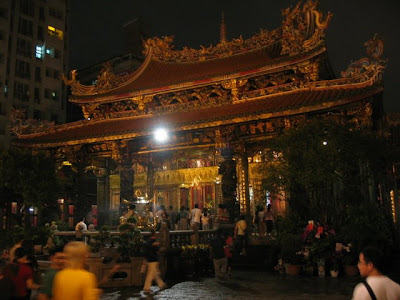There is a vague boundary between religions in Taiwan. The English term “to convert” doesn’t seem to exist in the society, since very often the Taiwanese say he/she believes in the Buddha, the Jade Emperor (and last month the journalists found someone who has been worshipping the statue of a politician for 20 years) at the same time. Last week for my fieldwork I visited a temple in Taipei, and got to see two young pop singers companied by their representatives asking the priest about their new album. I think the two singers are probably lay people and not disciples in strict sense; nonetheless it’s not surprising to see people go to the temple to ask about the future because temples have been one of the information sources in Taiwanese life.
To exclude any gods/ghosts is offensive to the supernatural world, and in addition to making someone feel guilty, the possible punishment brings anxiety. It is understandable why Christianity has difficulties being popular in Taiwan. People could have hard time to understand “why can’t I bow and send greetings to my ancestors while being a Christian?” Some Christians indeed upset the society, because they go to their hometown trying to destroy the ancestral tablets and claim that their families are heterodox by worshiping the idols.
Two weeks ago I went to Tainan- the historical city which might have the biggest number of temples in Taiwan- and on my way down to the south I saw a lot of temples and graveyards along the highway, or located in the center of the rice field. While taking photos, I can’t stop wondering how I should answer the question to my fieldwork: what is the meaning of the ritual for people in Taiwan?
 Along the highway one can see the decorative roofs of the temples
Along the highway one can see the decorative roofs of the temples The most beautiful temple I’ve ever visited in Taiwan: the Dragon Mountain Temple (Longshan Si) in Taipei
The most beautiful temple I’ve ever visited in Taiwan: the Dragon Mountain Temple (Longshan Si) in Taipei







 As some of my friends know, I’m a computer illiterate; no, I'd rather say that I’m a technology illiterate. Therefore I didn’t know how to use a digital camera until the beginning of this year when I went to Europe, and my IBM Thinkpad laptop has stayed with me for 7 years (so IBM is really good). Actually I like technology, and really appreciate its contribution to modern life, although sometimes I believe it has been misused to satisfy undisciplined desire of human kind. A lot of people have talked about the autonomy of technology, but we’re not that against it. The only reason I’m so behind of technology is laziness.
As some of my friends know, I’m a computer illiterate; no, I'd rather say that I’m a technology illiterate. Therefore I didn’t know how to use a digital camera until the beginning of this year when I went to Europe, and my IBM Thinkpad laptop has stayed with me for 7 years (so IBM is really good). Actually I like technology, and really appreciate its contribution to modern life, although sometimes I believe it has been misused to satisfy undisciplined desire of human kind. A lot of people have talked about the autonomy of technology, but we’re not that against it. The only reason I’m so behind of technology is laziness.

